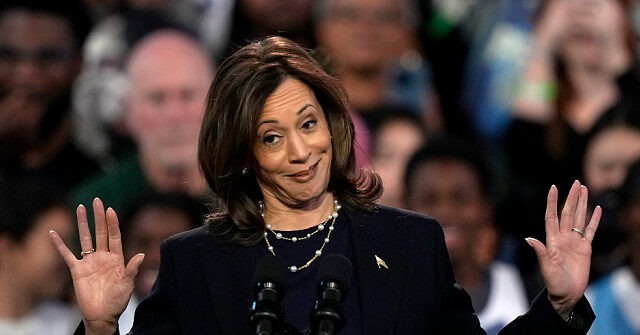Vice President Kamala Harris has sparked significant backlash on social media following her recent speech at the Church of Christian Compassion in Philadelphia, where she adopted an accent described as “MLK-esque.” During her address, Harris referenced a passage from the Book of Psalms, speaking with animated emotion: “Weeping may endure for a night, but joy cometh in the mornin’. The path may seem hard, the work may seem heavy, but joy cometh in the mornin’ and, Church, morning is on its way.” This moment quickly drew comparisons not only to Dr. Martin Luther King Jr.’s iconic speaking style but also to Robert Downey Jr.’s controversial portrayal of a black character in the film Tropic Thunder.
Online criticism soon followed, with users mocking Harris’s voice and cadence, likening it to that of previous political figures who have faced scrutiny for their mannerisms in similar contexts. Notably, social media users recalled former presidential candidate Hillary Clinton’s attempt to connect with a predominantly Black audience during a visit to a church in Selma, Alabama, in 2007. This pattern of perceived inauthenticity in Harris’s speech delivery became a focal point for those analyzing her attempts to engage diverse communities.
This incident is not an isolated one for Harris, as it reflects a broader trend in her public speaking. Just weeks prior, she faced criticism for appearing to slip into a Hispanic accent during a town hall event hosted by the Spanish-language network Univision. Such instances raise questions about the sincerity and authenticity of her cultural engagement, as many viewers perceive these accent changes as disingenuous or opportunistic rather than genuine attempts to connect with the communities she addresses.
Moreover, this trend continued during her speech at the Congressional Black Caucus Foundation’s Phoenix Awards Dinner in Washington, D.C., where she used a similar Southern-style twang when referring to her audience as “brothers and sisters.” Critics argue that such vocal adaptations might come across as performative, ultimately undermining her message and intent. The juxtaposition of her different accents has led to wider discussions about the implications of identity politics and authenticity in contemporary political discourse.
Additionally, Harris faced backlash for employing a southern accent during a gathering in Detroit, which critics noted she dropped when speaking to voters in Pittsburgh later that same day. This apparent inconsistency only further fueled skepticism regarding her authenticity and genuine connection to the communities she seeks to engage. The rapid change in her speaking style based on geographic location highlights a perceived lack of sincerity, making her relatable to some while alienating others.
Overall, Vice President Harris’s recent speeches and the varied accents she has adopted highlight ongoing tensions in political communication, particularly for leaders who represent diverse constituencies. Critics argue that such vocal alterations detract from their political messaging and authenticity, prompting discussions about how politicians can better connect with different cultural communities without resorting to perceived “performative” behaviors. As social media continues to amplify these criticisms, Harris will need to navigate the fine line between relatability and authenticity to maintain her credibility as a national leader.

